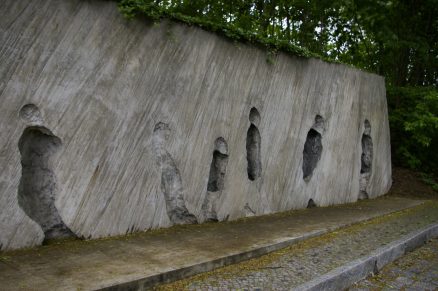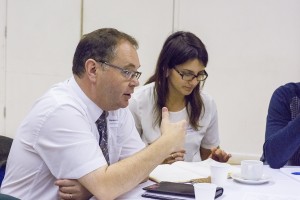Further information on the themes of the conference
In the mid- to late-1970s, the afterlife of the Nazi extermination of Europe’s Jews entered into a new phase. Research has shown that there was never ‘silence’ per se around the genocide of the Jews in the immediate post-war decades, and notable developments did occur during the 1940s, 50s, and 60s. Yet it was in the 1970s that much greater strides were made, thanks in part to the international emergence of “the Holocaust” as a collective conception. By no means did this bring resolution or consensus, nor did it necessarily spur immediate confrontation with this dark past.
 The Memorial at Grunewald Railway Station, Berlin:
The Memorial at Grunewald Railway Station, Berlin:
the site of deportation for Berlin’s Jews.
This conference is concerned specifically with what has happened in the ensuing decades since the mid- to late-1970s. Ours is the generation in which Holocaust memory has grown exponentially, expanding and extending at such a rate that it not only permeates Western culture and society, but now has global proportions. Nor is there any indication of this slowing down any time soon; instead, increased concern at the passing of survivors has given but further impetus to attempts to teach, learn, and remember the Holocaust, whilst its continued representation raises ongoing interest in its abstraction and appropriation.
The conference seeks to explore and examine the development of Holocaust history and memory over the past four decades. Our specific areas of interest include:
- The social, political and cultural memories of the Holocaust that have emerged over the past generation.
- What trajectories have these followed, how and why?
- What structural forces and individual agencies have driven these memories, and to what ends?
- Given that Holocaust memory has become a dimension of our contemporary condition, how have the fortunes of Holocaust history and remembrance interfaced and intersected with major historical events like the cessation of the Cold War, transnational trends such as Europeanisation and globalisation, and transcultural phenomena like human rights?
- To what extent have our social, political and cultural memories of the Holocaust allowed or prevented us from confronting other genocides and instances of man-made atrocity?
- And finally how do we begin to historicize the explosion of Holocaust memory, to determine what influence new threats and challenges – from climate change to the “war on terror” – exert on how we think and use the Holocaust?
Click on the links for more information on:
- Confirmed Keynotes
- Bookings & Conference Schedule
- Venue, & Accomodation
- Contacting the conference organiser
Conference presentations have been gathered following a call for papers, and will consist of symposia, individual papers and workshop presentations.
- Research Symposia will last 90 minutes and will consist of three linked papers of 20 minutes each and include a discussant
- Individual research papers will last 30 minutes, including 10 minutes of discussion and will be organised into streamed sessions of 90 minutes duration.
- Workshop presentations will last 45 minutes and should be focused on sharing a teaching strategy or other resource in an interactive way. Workshops will be combined into joint sessions of 90 minutes duration.

